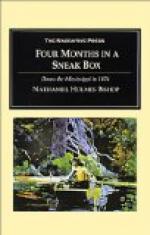[The portage across Crooked Island.]
Our survey of the portage gave encouraging results. The Gulf of Mexico was only four hundred feet from the bay, and the shortest route was the best one; so, starting energetically, we dragged the boats by main force across Crooked Island, and launched them in the surf without disaster. We then rowed as rapidly as the rough sea would permit along the coast towards the wide opening of St. Joseph’s Bay, the wooded beaches of which rose like a cloud in the soft mists of a sunny day. The bay was entered at four o’clock in the afternoon, and, being out of water, we hauled our boats high on to the beach, and searched eagerly for signs of moisture in the soil.
Leaving Saddles to build a fire and prepare our evening meal, I proceeded to investigate our new domain, and soon discovered the remains of a cabin near a station, or signal-staff, of the United States Coast Survey. Men do not camp for a number of days at a time in places destitute of water; and the fact of the cabin having been built on this spot proved conclusively to me that water must be found in the vicinity. After a careful and patient search, I discovered a depression in the high sandy coast, and although the sand was perfectly dry, I thought it possible that a supply of water had been obtained here for the use of the United States Coast Survey party—the same party which had erected the cabin and planted the signal near it.
Going quickly to the beach, I found the shell of an immense clam, with which I returned, and using it as a scoop, or shovel, removed two or three bushels of sand, when a moist stratum was reached, and my clam-shovel struck the chime of a flour-barrel. In my joy I called to Saddles, for I knew our parched throats would soon be relieved. It did not take long to empty the barrel of its contents, which task being finished, we had the pleasure of seeing the water slowly rise and fill the cistern so lately occupied by the sand. In half an hour the water became limpid, and we sat beside our well, drinking, from time to time, like topers, of the sweet water. Our water-cans were filled, and no stint in the culinary department was allowed that evening.
The flames from our camp-fire shot into the soft atmosphere, while the fishes, attracted by its glare, leaped by scores, in a state of bewilderment, from the now quiet water. St. Joseph’s Bay has an ample depth of water for sea-going vessels, while its many species of shells make it one of the best points on the northern Gulf coast for the conchologist.
Although sorry to leave our limpid spring, we launched the boats at seven o’clock the next morning, following the north side of the bay until we arrived at the deserted site of the city of St. Joseph. It seemed impossible to realize that on this desolate spot there had been, only thirty or forty years before, a prosperous city, with a large population and a busy cotton-port, accessible to the largest vessels, and threatening a steady rivalry with Apalachicola. Railroads were the enemies of these southern cities as they diverted the cotton, grown in the interior, from its natural channels by river to the Gulf of Mexico.




